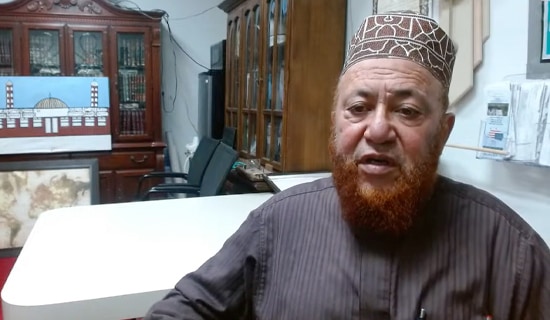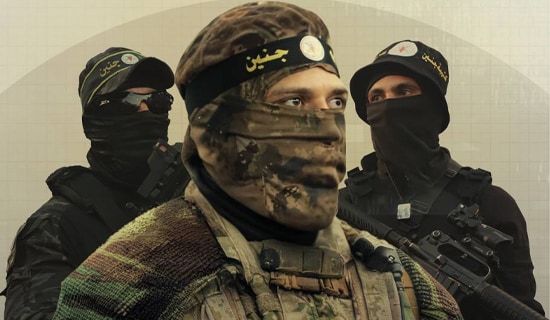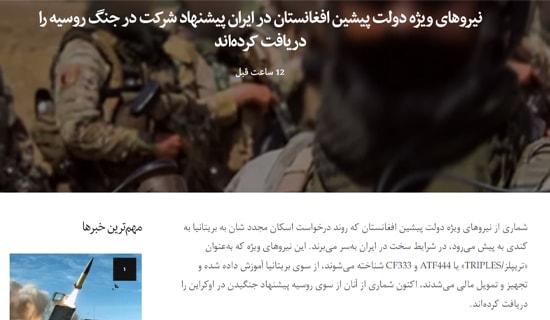On January 28, 2024, three U.S. troops were killed and dozens were wounded in a drone attack carried out by Iran-backed militias in Iraq against Tower 22, a logistics support base in northeast Jordan near the Syrian border.[1] In response, on February 2, U.S. forces attacked a series of targets of the Iran-backed militias in Syria and Iraq.[2]
The Iran-backed militias' attack on the U.S. base in its territory embarrassed Jordan, which tried to obscure the fact that the incident took place on sovereign Jordanian soil. The spokesperson of the Jordanian government, Muhannad Al-Mubaidin, initially denied that the attack was in Jordan,[3] claiming instead that it occurred across the border, at the Al-Tanf base in Syria.[4] Subsequently, he said in an official statement that the drone hit "an outpost on the Syrian border," again without explicitly admitting it was on Jordanian soil.[5] This obfuscation of the base's location is apparently an attempt by Jordan to distance itself from the incident, in order to avoid having to retaliate against Iran and its militias.[6] The Jordanian press barely referred to the incident, which may be another indication of Jordan's desire to dissociate itself from it. In fact, one of the few press articles that did referred to the attack claimed that it had not occurred on Jordanian soil and stressed that Jordan had nothing to do with it.[7]
The Iran-backed militias' attack on the U.S. base in Jordan only increases Jordan's concern about Iran and about the presence of its militias on the Syria-Jordan border, which Jordan regards as a grave strategic threat to its security and stability.[8] In recent months, these militias have increased their attempts to smuggle drugs and weapons into Jordan over the Syrian border, and Jordan's security forces are waging a stubborn campaign against the smugglers in an effort to thwart these attempts, including by means of airstrikes in Syrian territory.[9]
Amid the Jordanian attacks in Syria, senior officials in the kingdom recently conveyed to their counterparts in Iran and Syria that Jordan will not tolerate the activity of the militias that is threatening its security. On January 6, Al-Mubaidin said tha,t "the tension on [Jordan's] northern border stems from the weakness of the Syrian regime" and added that Jordan "has already warned about the danger of Iran's expansion in the region."[10] On December 18, 2023, after the Jordanian Armed Forces foiled a large-scale attempt to smuggle drugs and weapons into the kingdom, which for the first time included rockets, Al-Mubaidin said that Jordanian Foreign Minister Ayman Al-Safadi had clarified to his Iranian counterpart, Hossein Amir Abdollahian, that "the smuggling attempts of the Iranian militias in Syria must stop."[11] The former head of Jordan's Drug Control Department, Tayel Majali, told an oppositionist Syrian television channel on February 9 that the drug-smuggling attempts have "political goals aimed at undermining Jordan's national security," and that "Jordan is aware of Iran's goals in the region and its efforts to take over [Jordanian] territory. Jordan," he added, "is acting on every level to prevent Iran from gaining a foothold within it."[12]
Jordan's concerns about Iran are also evident in many press articles published in recent months that criticize this country, although sometimes without explicitly naming it. The articles accuse Iran of waging an undeclared war against Jordan on its northern border, in an attempt to infiltrate the country and gain influence within it, as it has done in other Arab states. They stress that Jordan's security is a red line that must not be crossed, that the Jordanian security forces will not hesitate to cut off any hand that reaches out to harm the kingdom, and that Jordan will never join the Iranian axis. One of the writers, Jordan's former ambassador to Iran, Bassem Al-Amoush, proposed to form ties with opposition elements in Iran in order to combat this country's attempts to undermine Jordan. Conversely, the board chairman of the state daily Al-Rai, Shhadeh Abu Bakr, called to initiate a dialogue with Iran before entering into conflict with it.
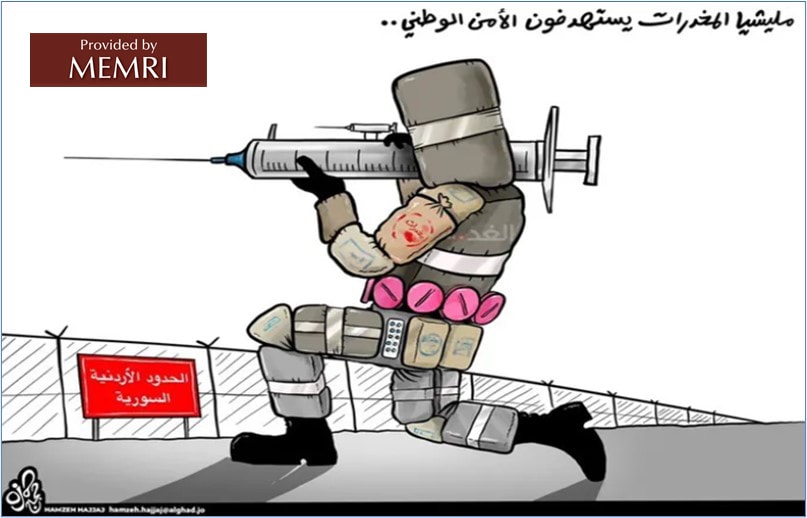
The drug militias threaten Jordan's national security" across the Syria border (Al-Ghad, Jordan, December 20, 2023)
This report presents the discourse in the Jordanian press over the last few months about the threat posed by Iran to the kingdom.
Jordanian Senator In Message To Iran: Jordan's Security Is A Red Line; We Will Cut Off Any Hand That Reaches Out To Harm It
In an article published in the state daily Al-Rai on January 30, 2024, two days after Iran-backed militias attacked a military base on Jordan's border with Syria and killed three American service members, Jordanian Senate member and former interior minister Hussein Hazza' Al-Majali slammed Iran without explicitly naming it. He wrote: "The ongoing incidents on our northern border constitute a genuine all-out, uncompromising war… against militias associated with certain regional powers [i.e., Iran] and whose loyalties, affiliation and ties are well known. These militias jeopardize the security, the existence, the interests and the positions of this sanctuary Hashemite Arab region [i.e., Jordan], and strive to weaken it and engage its sovereign bodies, chief of them our armed forces and security apparatuses, [in constant fighting with them].
"The events have now taken on new dimensions of a war against the gangs and militias [that smuggle] drugs and weapons [into Jordan], for they do not engage in drug-smuggling alone. These militias, affiliated with the defeated Syrian regime, are waging an [actual] military war… against Jordan, which will therefore act with the utmost determination and by every means to defend its borders and address the matter as it is.
"This scenario cannot be interpreted in any other way except in the obvious manner. The ones sponsoring these sectarian [i.e., Shi'ite] militias on Jordan's northern border are regional forces, which are clearly hatching an old-new conspiracy with a sister country [Syria]…Our message to the regional forces that are activating these criminal gangs and sectarian militias is that Jordan's security and stability are a red line, and we will cut off any hand that reaches out to harm this homeland…"[13]
Six weeks before the publication of this article, on December 18, 2023, the Jordanian daily Al-Dustour published an editorial in a similar vein, titled "[Regarding] Our Northern Border – Do Not Try Our Patience, for Our Security and Stability Are a Red Line," which likewise conveyed a firm message to Iran without naming it. The editorial said: "We say to everyone who is operating these gangs that Jordan's security and stability are a red line, and that anyone who tests our patience and tries to confound us with equations that we have rejected since the start of the Syrian crisis is a deluded fool. This time we regard the messages conveyed by [the activity on] our northern border – namely the attempts to smuggle weapons and rockets [into Jordan] – as obvious attempts to attack [us], which will be dealt with firmly and harshly. We will cut off any hand that reaches out to harm this homeland…
"Jordan's security and stability are not up for bargaining, and whoever harms us will encounter firm deterrence and the necessary harsh [response]… We will not accept any excuse for attempts to harm our security and stability, and we will not tolerate anything short of an end to the terrorist organizations and the gangs of smugglers, which are operated by forces known to us… Do not try our patience. We know who is operating these gangs, and our brave army will stand like an impregnable fortress against the attackers, as it always does. We say to the heroes of our armed forces: Strike with an iron fist, we are with you. All the efforts of these organizations, and of the regional forces that operate them, will be thwarted. Jordan will remain a thorn in the side of these forces and militias…"[14]
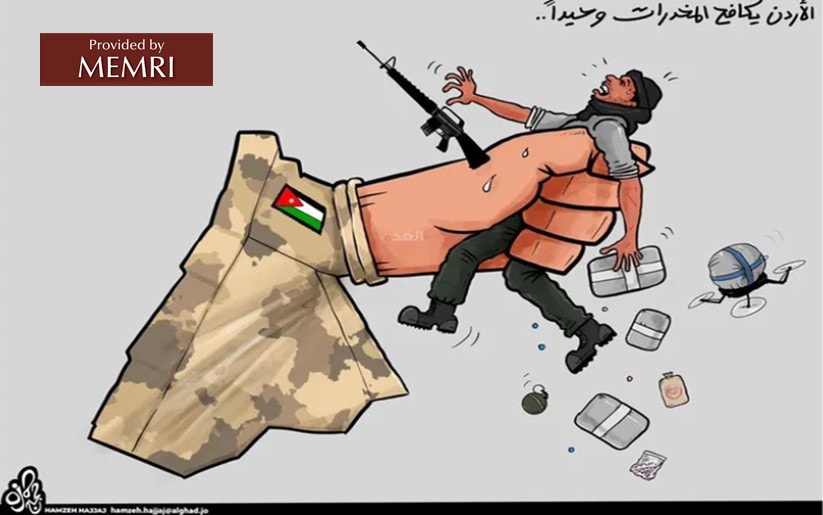
"Jordan combats the drug [smugglers] on its own" (Al-Ghad, Jordan, December 27, 2023)
Jordanian Senator And Former Minister: The Resistance Axis And Iran Must Realize That Jordan Is An Independent Country That Will Not Surrender To Them
Jordanian Senator and former minister of agriculture Dr. Akef Al-Zo'abi also addressed the drug war waged against Jordan by the Iran-backed militias and the attempts of Iran and its proxies to undermine the kingdom. In an article posted on Jordan's Ammon News website on December 26, he wrote that Iran and its proxies must understand that Jordan is an independent country that can take care of itself and defend its security, and that it will never join the resistance axis: "In the last five years…. the militias of the resistance [axis] in Syria made intensive [efforts] to harm Jordan, and lately they have flagrantly exacerbated their drug-war against us, in both quantity and quality. The attacks intensified, with more attackers using more advanced weapons. But the worst thing is that they have taken the opportunity to intensify their attacks precisely now, when Jordan is busy repelling the aggression against Gaza and its resistance. They stubbornly insist on interfering in Jordan's internal affairs and on harming it…
"Jordan never succumbed to pressure from the rejectionist axes [that emerged] in the 1950s and 1960s, which was manifested in military coups and sadly brought disaster upon their countries. And it will not succumb to [the current] pressures to join the resistance club and become its fifth member, alongside Lebanon, Iraq, Syria and Yemen. Jordan has chosen its way and knows where its interests lie…
"The leader of the resistance [i.e., Iran] has repeatedly tried, and is still trying, to interfere in Jordan's affairs, and its embassy in Amman has been involved in this.[15] Jordan sufficed with diplomatic measure to resolve this affair, as is its custom, so that the details do not become known and aggravate [the situation]. [Iran's] allies in Lebanon also tried repeatedly to smuggle weapons into Jordan, and Jordan quietly put this behind it as well. Yet the attacks on Jordan continue, although the Jordanian army has taught the Captagon[16] gangs and the resistance-club militias a bitter lesson, again and again. It's time that the resistance axis and its leader [Iran] realize that Jordan was, and will continue to be, an independent country… Its role, its approach, its responsibility and its policy are geared towards the homeland and its people, and first of all towards [defending] its security and stability."[17]
Former Jordanian Information Minister: Iran Is Using Its Arab Supporters To Enhance Its Influence In The Region
On January 30, two days after the attack of the Iran-backed militias on the outpost on Jordan's border with Syria, in which three U.S. troops were killed, former information minister Samih Al-Mua'ita published an article in which slammed Iran and its militias without explicitly addressing the attack on Jordanian soil. He wrote that Iran uses every crisis in the Arab countries to infiltrate them, and uses its Arab supporters to gain more influence in the region: "The fact that there are Shi'ites in some of the Arab countries is not the problem. [These countries] contain diverse religions, sects, ethnicities and religious creeds. The bigger problem [emerges] when [an Arab Shi'ite] stops being loyal to his country and nation and becomes a supporter of the Iranian imams and a soldier of the Persian enterprise in the region. [The problem is] what Iran calls the Rule of the Jurisprudent, which means that its Supreme Leader is the authority on all matters. He makes the decisions and is the only valid source of directives for a believing Shi'ite. This means that the [Arab Shi'ite's] homeland and its leadership, and all other sources of authority except for the [Ruling] Jurisprudent, [are meaningless]… Iran has been working since the 1980s to recruit groups of Shi'ite Arabs to its enterprise by establishing militias and organizations in countries that have Arab Shi'ite [citizens]…
"Since the advent of its current regime, Iran has used two things – sectarianism and the Palestinian cause – to advance its Persian enterprise. Therefore, it now exploits every crisis that occurs in an Arab country to infiltrate that country and gain influence [within it]. [At the same time,] despite decades of media hostility towards Israel and the U.S., not a single bullet has been fired by an Iranian soldier at these [countries]. Iran uses its [Shi'ite] Arab supporters to expand its influence zones and increase its leverage, in order to promote its Persian enterprise…"[18]
Former Jordanian Ambassador To Iran: We Should Form Ties With Opposition Elements Within Iran In Order To Repel Its Attempts To Undermine Jordan
Jordanian diplomat and politician Bassam Al-Amoush, who served as Jordan's ambassador to Tehran and as minister of parliamentary affairs and administrative development, wrote an article on the Jordanian news site Ammon News in which he slammed Iran's subversive policy in the region and especially in Jordan, and called to deter it both by military means and by forming ties with Iranian opposition elements:
"The Iran I will speak of today is the Iran of the mullahs, not the country [itself] or its people. My comments refer only to the regime that was placed in the hands of Khomeini in 1979, when the stage of British colonialism gave way to the stage of American colonialism, out of fear of a Soviet takeover… the area was to create a new rift in the Islamic nation, in the form of sectarian division. To this end, the slogan of exporting [Iran's Islamic] Revolution was brandished, and delegations of Islamic movements [i.e., the Muslim Brotherhood], lacking sufficient political awareness, arrived [in Iran] one after the other. Some of these [movements even] demanded that Khomeini declare an Islamic caliphate!! This prompted several [Sunni] countries, including Jordan, to sever their diplomatic relations [with Iran], and to renew them only after the talk about exporting the revolution stopped… The relations stagnated and suspicion prevailed. At the same time, the Iranian embassy [in Jordan] recruited political and media groups and formed ties with them. This came to the point of forming an armed militia that was exposed, which caused Jordan to expel the [Iranian] ambassador….
"The Iranians tried to gain a foothold [in Jordan], sometimes in the guise of [religious] tourism [to Shi'ite sites in the kingdom] and sometimes in the guise of taking part in the Disi Water Conveyance [Project].[19] Today they have shifted to trying to infiltrate Jordan forcefully by smuggling weapons and drugs [into the country] from Syria, and their clashes with our army are almost unceasing. They also exploited the Al-Aqsa Flood [war, i.e., the war between Israel and Hamas in Gaza] and demanded to enter [Jordan] through Iraq in order to come to Gaza's rescue!![20] They insist on infiltrating our country, and my anger is not directed at them but at our government, which is called upon to take every precaution and all the measures necessary in order to defeat and deter them, rather than suffice with an unceasing and undeclared war [against Iran].
"There is a need to expose [the Iranians], raise public awareness of the dangers they pose and form a popular force that will aid the army and whose only mission will be to stop [the Iranian infiltration]. We should also form ties with the oppressed Iranian people: with the Sunni Arabs in Ahvaz, with the Sunni Kurds and with the Shi'ites of the [oppositionist] Mujahedin Khalq [organization], so as to gain leverage on the imperialist [Iranian] regime that sows devastation and destruction in our Arab and Islamic countries and in [other] world countries."[21]
Official At Al-Rai Daily Calls For Dialogue With Iran To Preserve Jordan's Interests
Shhade Abu Bakr, board chairman of Jordan's state daily Al-Rai, also published articles addressing the danger posed to Jordan by the militias loyal to Iran.[22] However, in a December 24, 2023 article titled "Dialogue between Jordan and Iran – Why Not?", he called to deal with this danger by initiating dialogue with Iran.
He wrote: "For many years now, Jordan's relations with Iran have not been good. In fact, they have been marked by feebleness and distance, and the reason for this is Tehran, not Amman. Jordan tried to establish normal relations with Iran, and sent more than one ambassador [to Tehran] to promote the relations between the countries, but the Iranian side did not really cooperate…
"Over the past two years, our brothers in the Gulf have started to regulate their relations with Iran, despite the tension that previously marked [these relations], and mutual visits were made by political and military officials at the highest levels. I will not address the general issue of Iran's political strategy in the Arab region, for it is known to all. But, like everyone else, I [also] know that the West, which is ostensibly in conflict with Iran, talks to it as well, both openly and in secret…
"Jordan is in a state of intermittent war on its northeastern border, where there are armed militias connected to Tehran and to its [regional] policy. This [Iranian] armed presence exists in Lebanon, Syria and Iraq. We [Jordanians] are not to blame for it, but rather the policy of the West and the silence of all the Arab countries in the region and beyond.
"As long as nobody is concerned about the grave danger posed by this presence – and [considering that] we Jordanians are especially exposed to its consequences… and that none of the Arabs care about us – there is nothing wrong with initiating serious and open dialogue with Tehran, in order to firmly put an end to the drug war, which is harmful, especially for us…
"The outcome of the war in Gaza will have many important implications, which will compel us to talk to everyone and quickly discover their intentions, for the sake of our interests, both short-term and long-term. This will benefit us greatly, whether the great powers like it or not. Nobody has a right to oppose our political policy, which corresponds to our interests, especially not people who [themselves] pursue their own interests based on their own political policy.
"If Tehran cooperates, very good. And if it rebuffs [us] and plays tricks, we [will know] that we did what we could, and [Iran] will face the consequences…"[23]
* Z. Harel is a research fellow at MEMRI; H. Varulkar is Director of Research at MEMRI.
[1] Centcom.mil, January 28, 2024. See MEMRI Special Dispatch No. 11110, After Using The Fighting In Gaza To Justify Attacks On U.S. Forces In Iraq And Syria, Iran And Its Proxies Temporarily Suspend Operations Due To Fear Of Large-Scale U.S. Response, January 31, 2024.
[2] Twitter.com/CENTCOM, February 2, 2024. Reports on social media claimed that Jordan had taken part in the U.S. counterattack; the Jordanian Armed Forces denied having participated in attacks in Iraq, but said nothing about the attacks in Syria. Al-Arabi Al-Jadid (London), February 3, 2024.
[3] Almamlakatv.com, January 28, 2024.
[4] The Al-Tanf base in Syria houses U.S. troops and plays a significant role in limiting the establishment of Iranian influence in the region and in combatting ISIS.
[5] Al-Ghad (Jordan), January 29, 2024.
[6] Addressing the conflicting claims about the base's location, Jordanian military analyst Ma'moun Abu Nawwar, formerly a high-ranking officer in Jordan's armed forces, said that "the claims that the attack was inside the kingdom mean that we [Jordanians] must respond [to it], and that is why Amman is being very precise about its location" (aa.com.tr, January 29, 2024).
[7] The article, by Jordanian journalist Ibrahim Abd Al-Majid Al-Qaisi, said: "The attack on the U.S. troops who died the day before yesterday [on January 28] in areas outside Jordan was not our responsibility and has nothing to do with us. As for the attempt to 'entangle us' [in it], we are not new to this political game. In fact, we have already proved to everyone that we have no interest in it and that we reject it." Al-Dustour (Jordan), January 30, 2024.
[8] In 2004 Jordan's King Abdullah II warned about Iran's attempts to expand in the region and create a Shi'ite territorial continuum stretching from Iran to Lebanon through Iraq and Syria, which he referred to as "the Shi'ite Crescent." See Washingtonpost.com, December 8, 2004. For more on Jordan's fear of Iran, see MEMRI Inquiry & Analysis No. 1359, Concern In Jordan Over Pro-Iranian Forces On Border, November 16, 2017; MEMRI TV Clip No. 9841, Former Jordanian Ambassador To Iran Bassam Al-Omoush: The Goal Of The Islamic Revolution In Iran Was To Establish A Persian Empire, Divide The Muslims, September 18, 2022; MEMRI Inquiry & Analysis No. 1683, Following Renewal Of Saudi-Iranian Relations, Debate In Jordanian Press Over Whether Jordan Should Also Reconcile With Iran, March 29, 2023.
In April 2023, following a phone conversation between the Jordanian and Iranian foreign ministers, the Jordanian, Arab and Iranian media reported that relations between the countries were warming and anticipated complete normalization between them – but so far this apparently hasn't occurred. See MEMRI Special Dispatch No. 10573, Repercussions Of Saudi-Iranian Deal: Jordan Is Close To Normalizing Relations With Iran, April 24, 2023; Special Dispatch No. 11034, Lebanese Journalist: Iran Exploiting The War In Gaza To Undermine Stability Of Jordan, December 21, 2023.
[9] Al-Sharq Al-Awsat (London), December 19, 2023; zamanalwsl.net, January 5, 2024; Syriahr.com, January 9, 2024; Al-Arabi Al-Jadid (London), January 18, 2024.
[10] Alarabiya.net, January 6, 2024.
[11] Alarabiya.net, December 18, 2023.
[12] Syria.tv, February 9, 2024.
[13] Al-Rai (Jordan), January 30, 2024.
[14] Al-Dustour (Jordan), December 18, 2023.
[15] The reference is to an attempt by the Iranian Embassy in Jordan to establish an armed militia in the kingdom. See MEMRI TV Clip No. 9901, Fmr. Jordanian Ambassador To Iran Bassam Al-Omoush: Iran Infiltrates Countries, Establishes Sleeper Cells – Its Ambassador To Jordan Even Tried To Form A Militia Inside Jordan; We Are Clashing Directly With Iranian Forces On Our Border With Syria, October 21, 2022.
[16] Captagon is a brand name for the amphetamine drug fenethylline hydrochloride.
[17] Ammonnews.net, December 26, 2023.
[18] Al-Ghad (Jordan), January 30, 2024.
[19] A project designed to pump water from the Disi aquifer in southern Jordan to Amman and other Jordanian cities. Amoush stated in an interview with Al-Arabiya that Iran offered to take part in the project but demanded that the work be carried out by Iranians. The Jordanian security authorities suspected that this was an attempt to bring IRGC personnel into the country, and the offer was consequently rejected (Alarabiya.net, October 21, 2022).
[20] The Iran-backed militias in Iraq encourage gatherings on the Iraq-Jordan border and attempts to breach the border under the slogan of solidarity with Gaza. In October 2023, for example, hundreds of Shi'ite Iraqis gathered at the Turaibil border crossing, demanding to cross into Jordan in order to "join the war and the jihad in Palestine." They staged a sit-in and tried to stop Iraqi oil trucks from passing through the crossing. Elements in Jordan accused the Iran-backed militias of organizing these protests. Railyoum.com, October 22, 28, 2023; Al-Arabi Al-Jadid (London), November 8, 2023.
[21] Ammonnews.net, January 13, 2024. For further excerpts from this artilce, see Special Dispatch No. 11117, Former Jordanian Ambassador To Iran: We Must Form Ties With Minorities And Oppositionists In Iran In Order To Repel Its Attempts To Undermine Jordan, February 5, 2024.
[22] Al-Rai (Jordan), December 19, 21, 2023.
[23] Al-Rai (Jordan), December 24, 2023.


